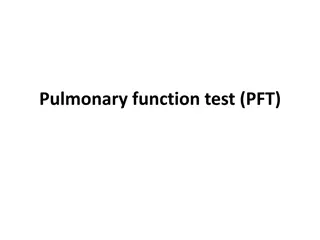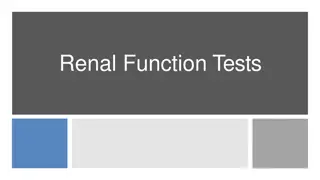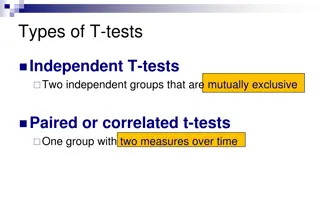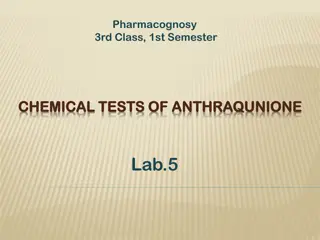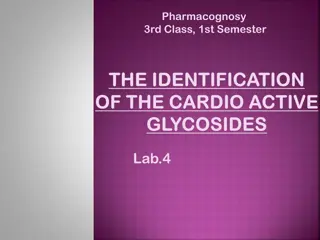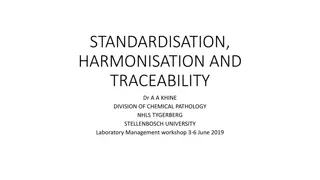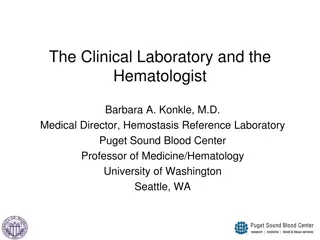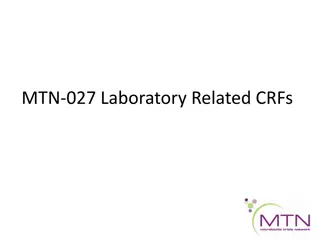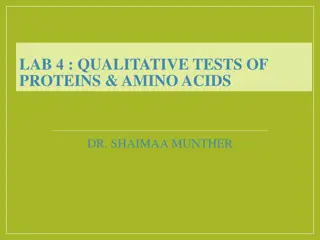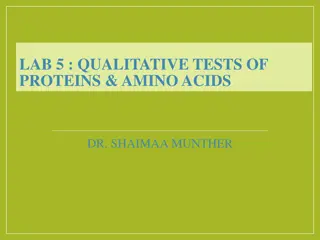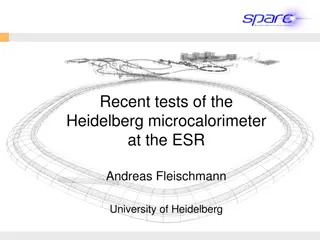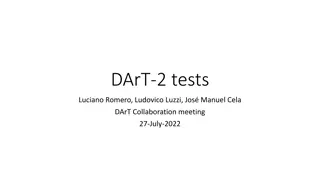Understanding Portable Laboratory Tests (TLPs)
Portable laboratory tests (TLPs) bring convenience but must not compromise quality and safety. Errors in the TLP process can impact patient safety, and the simplistic notion of error-proof TLPs is misguided. Quality and safety standards for TLPs should not be shifted to society, and performing tests outside traditional labs should be seen as complementary, not competitive. Ensuring equivalent quality for tests conducted outside the lab is crucial.
Download Presentation

Please find below an Image/Link to download the presentation.
The content on the website is provided AS IS for your information and personal use only. It may not be sold, licensed, or shared on other websites without obtaining consent from the author. Download presentation by click this link. If you encounter any issues during the download, it is possible that the publisher has removed the file from their server.
E N D
Presentation Transcript
TESTES LABORATORIAIS PORT TEIS (TLPs)
LOGOMARCA ENTIDADES
Os TLPs representam um grande avano, tm e ter o cada vez mais espa o, mas n o se pode descuidar da qualidade na sua execu o. A seguran a do paciente preocupa o a nossa
Os Testes Laboratoriais Portteis (TLPs) podem ser realizados fora do Laborat rio, mas n o por isso deixam de ser exames laboratoriais e est o sujeitos maioria das vari veis que atuam sobre qualquer outro teste laboratorial, sejam elas pr - anal ticas, anal ticas ou p s-anal ticas
Erros ocorridos em qualquer parte do processo do TLP diretamente a sua qualidade e colocar em risco a seguran a podem impactar do paciente.
A ideia simplista de que TLR prova de erros ou qualquer um pode realiz - lo n o se aplica ao seu uso seguro e n o a vis o das entidades cient ficas mundiais.
No podemos transferir para a sociedade civil o nus de julgar onde, como, por quem, e se os exames adequadamente controlados e seguros laboratoriais s o
No entendemos a realizao de exames fora do laborat rio como uma concorr ncia, mas sim como uma atividade complementar. Assim temos visto em outros pa ses..
Portanto, equivalentes que s o exigidos para os mesmos exames realizados no laborat rio devem merecer os cuidados
Os problemas detectados pela ANVISA nos glicos metros perduraram durante d cadas. Milh es de exames foram realizados com erros causando impactos aos pacientes (eventos adversos)
Falta de anlise prvia do desempenho anal tico dos produtos registrados pela Anvisa
A faixa denominada controle (C) no controle da qualidade, mas um indicador da corrida imunocromatogr fica
As preocupaes operacionais com os TLPs est o presentes nos Estados Unidos que um pa s l der na populariza o desses procedimentos
Estudos tem demonstrado que muitos TLPs apresentam resultados incorretos (CMS Centers for Medicare and Medicaid Services)
Existe o mito de que o TLP to simples de ser executado que n o necessita de valida o, controle da qualidade ou treinamento extenso.
Estudos tem demostrado que 65,3% dos erros nos TLPs est o na fase anal tica. Nos testes tradicionais realizados no laborat rio estes segundo Plebani erros s o 13,0%
OS ASSEGUREM A CONFIABILIDADE E A QUALIDADE DO CUIDADO , INDEPENDENTE DO LOCAL ONDE SEJAM REALIZADOS OS EXAMES LABORAT RIOS DEVEM TER PROCESSOS QUE
Os TLPs tem custo significativamente maior que os testes tradicionais e, portanto, n o representam uma econ mica alternativa mais
A ISO 22870:2016 POCT testing- Requerimentos para compet ncia, recomenda necessidades cl nicas, financeiras, a exequibilidade t cnica sejam definidas para o a qualidade que as implica es e as uso dos POCTs. - CB 36 da ABNT
A segurana dos pacientes no pode ser colocada em risco pela vis o equivocada de uma aparente simplicidade dos TLPs, j que s o estruturas tecnol gicas complexas.
Cabe apoiados pelas sociedades e evid ncias cient ficas, a tarefa de publicar resolu es que garantam a qualidade t cnica dos exames e a confiabilidade dos resultados oferecidos a popula o. aos organismos reguladores,
A grande vantagem dos TLPs a sua capilaridade quanto ao local de execu o, eliminando o transporte de amostras e reduzindo o tempo de obten o de resultados* * Desde que respeitadas as boas praticas laboratoriais
A possibilidade de resultados falso positivos conhecida, mas o grande problema epidemiol gico s o os resultados falso negativos
A realizao de TLPs em ambientes desconectados da rede de assist ncia agrava a j existente fragmenta o do cuidado sa de*
- Os TLPs representam um grande avano e tem e ter o cada vez mais espa o, mas n o se pode descuidar da qualidade na sua execu o. - necess ria a revis o dos crit rios de registro de TLPs pela Anvisa - S o necess rios crit rios equivalentes aos descritos na RDC302:2005 vigente - necess ria a fiscaliza o efetiva e padronizada da realiza o de TLPs pelas Vigil ncias Sanit rias.
BIBLIOGRAFIA CONSULTADA E RECOMENDADA (1) Lippi G, Plebani M. Streamlining laboratory expenditures through direct to consumer testing and reference prices: first do not harm. Ann Transl Med 2016;4(21):424. doi: 10.21037/atm.2016.09.41 (2) Bonini P, Plebani M, Ceriotti F, et al. Errors in laboratory medicine. Clin Chem 2002;48:691 8. (3) O'Kane MJ, McManus P, McGowan M, et al. Quality error rates in point-of-care testing. Clin Chem 2011;57:1267 71 (4) Joesph Wiencek & James Nichols (2016): Issues in the practical implementation of POCT: overcoming challenges, Expert Review of Molecular Diagnostics, DOI: 10.1586/14737159.2016.1141678 (5) Lippi G , Plebani M, FavaloroJ, Trenti T. Laboratory testing in pharmacies. Clin Chem Lab Med 2010;48(7):943 953 (6) Gronowski AM et al. Pharmacists in the Space:Friends or Foes? Clinical Chemistry 2016, 62:5 679 683 (7) ) St John A, Price C P. Existing and Emerging Technologies for Point-of-Care Testing. Clin Biochem Rev 35 (3) 2014 (8) Pocius M.https://mg.mail.yahoo.com/neo/launch?.rand=6ihbjpujf2irj#9302531687. January 20, 2017<acesso em 20.01.17> (9) St John A, Price C P. Existing and Emerging Technologies for Point-of-Care Testing. Clin Biochem Rev 35 (3) 2014 (10) ) Joesph Wiencek & James Nichols (2016): Issues in the practical implementation of POCT: overcoming challenges, Expert Review of Molecular Diagnostics, DOI: 10.1586/14737159.2016.1141678 (11) Lippi G, Guidi GC, Mattiuzzi C, et al. Preanalytical variability: The dark side of the moon in laboratory testing. Clin Chem Lab Med 2006;44:358 65. (11) (12) Lippi G , Plebani M, FavaloroJ, Trenti T. Laboratory testing in pharmacies. Clin Chem Lab Med 2010;48(7):943 953 (13) Diretriz para a Gest o e Garantia da Qualidade de testes laboratoriais remotos (tlr) da Sociedade Brasileira de Patologia Cl nica/ Medicina Laboratorial (SBPC/ML).2013
(14) Luppa PB, BietenbeckA, Beaudoin C, Giannetti A. Clinically relevant analytical techniques, organizational concepts for application and future perspectives of point-of-care testing. Biotechnology advances 34(3) January 2016 (15) ISO 22870:2016. Point-of-care testing (POCT) Requirements for quality and competence (16) U.S. Department of Health and Human Services, Health Care Finance Administration. Clinical laboratory improvement amendments of 1988, final rule. Federal Register 1992, 7001 288. (17) Herd G, Musaad SM. Clinical governance and point-of-care testing at health provider level. N Z Med J. 2015 Jul (18) Joesph Wiencek & James Nichols (2016): Issues in the practical implementation of POCT: overcoming challenges, Expert Review of Molecular Diagnostics, DOI: 10.1586/14737159.2016.1141678 (19) Lewandrowski K, Gregory K, Macmillan D. Assuring Quality in Point-of-Care Testing. Arch Pathol Lab Med. 2011;135:1405 1414; doi:10.5858/arpa.2011-0157-RA (20) Joesph Wiencek & James Nichols (2016): Issues in the practical implementation of POCT: overcoming challenges, Expert Review of Molecular Diagnostics, DOI: 10.1586/14737159.2016.1141678 (21) Diretrizes para a gest o e garantia da qualidade de Testes Laboratoriais Remotos (TLR) da Sociedade Brasileira de Patologia Cl nica/Medicina Laboratorial (SBPC/ML). 2.ed. Barueri, SP: Minha Editora, 2016. (22) Australian Government Department of Health. NATIONAL PATHOLOGY ACCREDITATION ADVISORY COUNCIL GUIDELINES FOR POINT OF CARE.2015. https://www.health.gov.au/internet/main/publishing.nsf/Content/35DE5FC4786CBB33CA257EEB007C7BF2/$File/Guidelines %20PoCT%201st%20Ed%202015.pdf <acesso em 19.08.2016> (23) PLEBANI, M. Does POCT reduce the risk of error in laboratory testing ? Clin Chim Acta. 2009 Jun;404(1):59-64. (24) Essential Tools for Implementation and Management of a Point-of-Care Testing Program. 3rded. CLSI guideline POCT04.Wayne,PA: Clinical and Laboratory Standards Institute
(25) National Academy of Clinical Biochemistry dos EUA (NACB- EUA). Laboratory Medicine Practice Guidelines - Evidence- based practice for point-of-care testing. 2007 https://www.aacc.org/~/media/practice- guidelines/point-of-care-testing/poct-entire-lmpg.pdf?la=en 26) Zaninotto M et al. Quality performance of laboratory testing in pharmacies: a collaborative evaluation. Clin Chem Lab Med 2016; 54(11): 1745 1751 Herd G, Musaad SM. Clinical governance and point-of-care testing at health provider level. N Z Med J. 2015 (27) Herd G, Musaad SM. Clinical governance and point-of-care testing at health provider level. N Z Med J. 2015 Jul 3;128(1417):41-6. (28) Herd G, Musaad SM. Clinical governance and point-of-care testing at health provider level. N Z Med J. 2015 Jul (29) Herd G, Musaad SM. Point-of-care testing governance in New Zealand: a national framework. The New Zealand Medical Journal. September 2013, Volume 126 Number 1383 (30) Nova Zelandia 2014 - New Zealand Best Practice Guidelines For Point-of-Care Testing 2014 - http://www.nzimls.org.nz/nz-point-of-care-testing-guidelines-2013.html <acesso em 18.08.2016> (31) Lippi G , Plebani M, Favaloro J, Trenti T. Laboratory testing in pharmacies. Clin Chem Lab Med 2010;48(7):943 953 (32) Adverse Event Reporting NOVA ZELANDIA BEST PRACTICES 2014 (33) Plebani M. Does POCT reduce the risk of error in laboratory testing? Clinica Chimica Acta 2009;204:59 64. (34) DE VRIES et al. Results of a survey among GP practices on how they manage patient safety aspects related to point-of- care testing in every day practice BMC Family Practice (2015) 16:9. (35) Lippi G , Plebani M, FavaloroJ, Trenti T. Laboratory testing in pharmacies. Clin Chem Lab Med 2010;48(7):943 953
(36) Nova Zelandia 2014 - New Zealand Best Practice Guidelines For Point-of-Care Testing 2014 - http://www.nzimls.org.nz/nz-point-of-care-testing-guidelines-2013.html <acesso em 18.08.2016> (37) NICHOLS, J.H. Risk management for point-of-care testing. The Journal of the International Federation of Clinical Chemistry and Laboratory Medicine. Vol. 25. Pag. 24 2014. (38) NICHOLS, JH. Medical errors Can we achieve an error-free system? POCT 2005; 4(4): 139. (39) PLEBANI, M. Does POCT reduce the risk of error in laboratory testing? Clin Chim Acta 2009; 404: 59 (40) Ehrmeyer SS, Laessig RH. Point-of-care testing, medical error, and patient safety: a 2007 assessment.Clin Chem Lab Med 2007;45(6):766 773 (41) PLEBANI, M. Does POCT reduce the risk of error in laboratory testing ? Clin Chim Acta. 2009 Jun;404(1):59-64. (42) Demers LM. Regulatory issues in point of care testing. In: Price CP, Hicks JM,editors. Point of care testing. Washington DC: AACC Press; 1999. p. 102 5 (43) Moore C. Point-of-care tests for infection control: should rapid testing be in the laboratory or at the front line? J Hosp Infect. 2013 Sep;85(1):1-7. doi: 10.1016/j.jhin.2013.06.005. Epub 2013 Aug 2. (44) Briggs C, Kimber S, Green L. Where are we at with point-of-care testing in haematology? Br J Haematol. 2012 Sep;158 (6):679-90. doi: 10.1111/j.1365-2141.2012.09207.x. Epub 2012 Jul 5. (45) Diretrizes para a gest o e garantia da qualidade de Testes Laboratoriais Remotos (TLR) da Sociedade Brasileira de Patologia Cl nica/Medicina Laboratorial (SBPC/ML). 2.ed. Barueri, SP: Minha Editora, 2016. (46) St Hill, H. Point-of-Care Testing Triad Patient Centered, Value-added Quality, and Cost-effective Care and Call for Interprofessional Evidence-Based Research and Practice. Point of Care Volume 15, Number 2, June 2016
(47) PLEBANI, M. Does POCT reduce the risk of error in laboratory testing ? Clin Chim Acta. 2009 Jun;404(1):59-64. (48) Gronowski AM et al. Pharmacists in the Laboratory Space:Friends or Foes? Clinical Chemistry 2016, 62:5 679 683 (49) Nova Zelandia 2014 - New Zealand Best Practice Guidelines For Point-of-Care Testing 2014 - http://www.nzimls.org.nz/nz- point-of-care-testing-guidelines-2013.html <acesso em 18.08.2016> (50) PLEBANI, M. Does POCT reduce the risk of error in laboratory testing ? Clin Chim Acta. 2009 Jun;404(1):59-64. (51) Lippi G , Plebani M, FavaloroJ, Trenti T. Laboratory testing in pharmacies. Clin Chem Lab Med 2010;48(7):943 953 (52) Musaad S M A, Khan S A, Herd G. Point-of-care testing: High time for a dedicated National Adverse Event Monitoring System. Clin Biochem Rev 36 (1) 2015. (53) PLEBANI, M. Does POCT reduce the risk of error in laboratory testing ? Clin Chim Acta. 2009 Jun;404(1):59-64. (54) Gronowski AM et al. Pharmacists in the Laboratory Space:Friends or Foes? Clinical Chemistry 2016, 62:5 679 683 (55) Joesph Wiencek & James Nichols (2016): Issues in the practical implementation of POCT: overcoming challenges, Expert Review of Molecular Diagnostics, DOI: 10.1586/14737159.2016.1141678 (56) O KANE, M J et al. Quality Error Rates in Point-of-Care Testing. Clinical Chemistry 2011, 57(9): 1267 1271 (57) Kathryn S. Dyhdalo, Peter J. Howanitz, ; David S. Wilkinson, Rhona J. Souers, Bruce A. Jones. Documentation of Quality Control and Operator Training at Point-of-Care Testing. Arch Pathol Lab Med Vol 138, November 2014 (58) Australian Government Department of Health. National Pathology Accreditation Advisory Council Guidelines for Point of Care.2015. https://www.health.gov.au/internet/main/publishing.nsf/Content/35DE5FC4786CBB33CA257EEB007C7BF2/$File/Guidelines%20 PoCT%201st%20Ed%202015.pdf <acessado em 19.08.2016>
(59) Australian Government Department of Health. National Pathology Accreditation Advisory Council Guidelines for Point of Care.2015. https://www.health.gov.au/internet/main/publishing.nsf/Content/35DE5FC4786CBB33CA257EEB007C7BF2/$File/Guideline s%20PoCT%201st%20Ed%202015.pdf <acessado em 19.08.2016> (60) Holt H, Freedman DB. Internal quality control in point-of-care testing: where s the evidence? Ann Clin Biochem March 2016 vol. 53 no. 2 233-239 (61) Larsson A, Greig-Pylypczuk R, Huisman A. The state of point-of-care testing: a european perspective. Upsala Journal of Medical Sciences. 2015; 120: 1 10 (62) New Zealand Best Practice Guidelines for Point-of-Care Testing (2014) (63) ISO 15189:2012. Medical laboratories requirements for quality and competence. Geneva, Switzerland: International Organization for Standardization, 2012 (64) ISO 22870:2016(E). Point-of-care testing (POCT) Requirements for quality and competence (65) Huisman W. European medical laboratory accreditation. Present situation and steps to harmonization. Clin Chem Lab Med 2012;50(7):1147 1152 (66) Plebani M, Does POCT reduce the risk of error in laboratory testing? Clin Chim Acta (2009), doi:10.1016/j.cca.2009.03.014 (67) PLEBANI, M. Does POCT reduce the risk of error in laboratory testing ? Clin Chim Acta. 2009 Jun;404(1):59-64. (68) Lippi G , Plebani M, FavaloroJ, Trenti T. Laboratory testing in pharmacies. Clin Chem Lab Med 2010;48(7):943 953 (69) Zaninotto M et al. Quality performance of laboratory testing in pharmacies: a collaborative evaluation. Clin Chem Lab Med 2016; 54(11): 1745 1751
(70) Permet P, Goudable J, Annaix V, Vaubourdolle M, Szymanowicz A. Guidelines for a formation of a multidisciplinary group fot point-of-care testing supervision according to EN ISO 22870. Ann Biol Clin (Paris) 2012;70:161 6 (71) Larsson A, Greig-Pylypczuk R, Huisman A. The state of point-of-care testing: a European perspective. Ups J Med Sci 2015;120:1 10. (72) http: //www.medtecheurope.org/industry-themes/topic/84 <acesso em 07.01.17> (73) Lippi G , Plebani M, FavaloroJ, Trenti T. Laboratory testing in pharmacies. Clin Chem Lab Med 2010;48(7):943 953(80) Hirst JA et al. Performance of point-of-care HbA1c test devices: implications for use in clinical practice a systematic review and meta-analysis. Clin Chem Lab Med 2017; 55(2): 167 180 (74) ISO 15197:2013 (Second Edition 15/05/2013) In vitro diagnostic test systems Requirements for blood-glucose monitoring systems for self-testing in managing diabetes mellitus.






